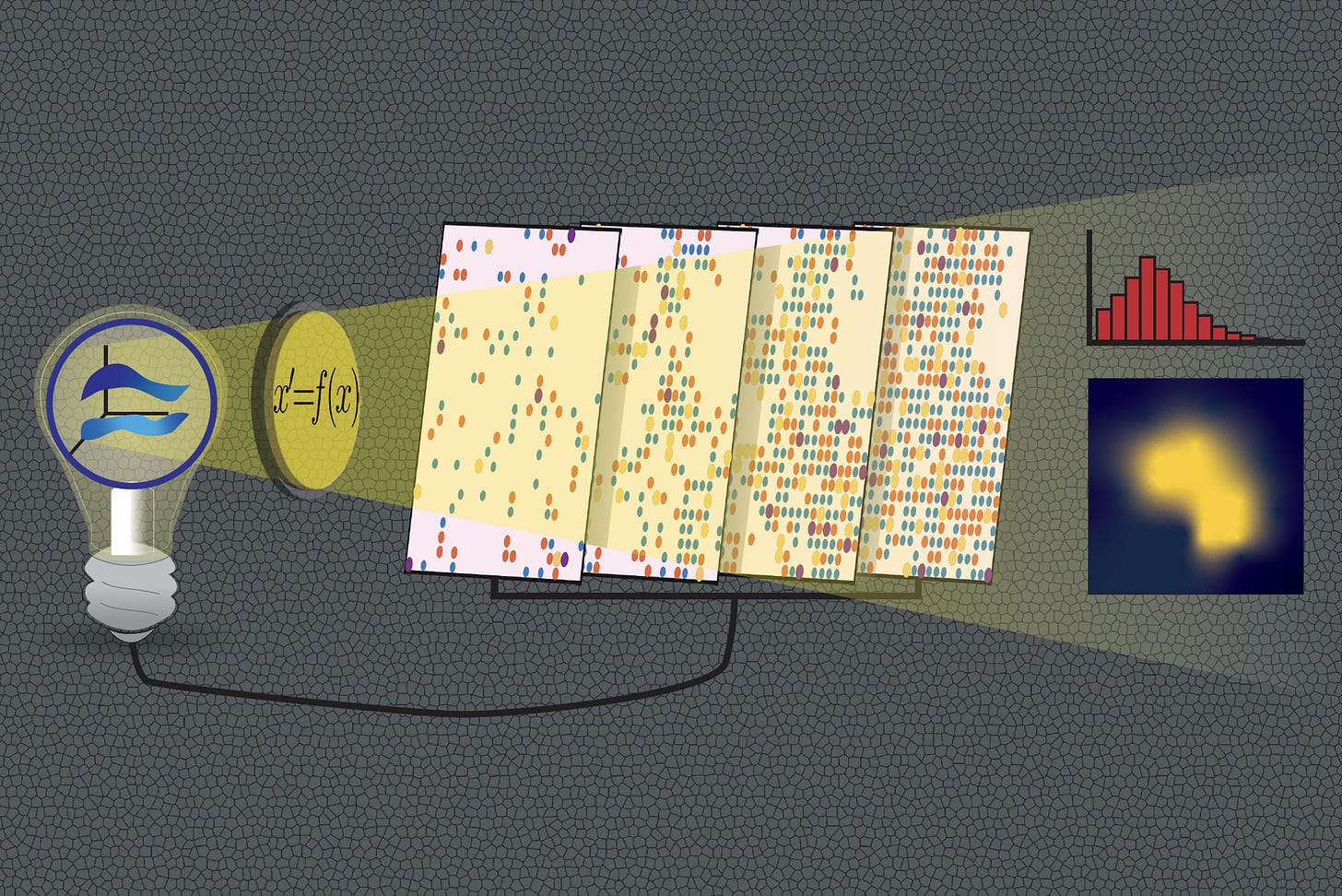This week in MathOnco 352
Pharmacokinetics,single-cell, bibliometrics, resistance, and more…
“This week in Mathematical Oncology” — November 20, 2025
> mathematical-oncology.org
From the editor:
Greetings from IISc! This week’s issue contains topics like pharmacokinetics,single-cell, bibliometrics, resistance, and more… I also made a link to the ISEEC conference this May, and a special issue in EMPH that I think many of you may be interested in!
Enjoy,
Jeffrey West
jeffrey.west@moffitt.org
A bibliometric study on mathematical oncology: interdisciplinarity, internationality, collaboration and trending topics
Kira Pugh, Linnéa Gyllingberg, Stanislav Stratiev, Sara HamisMultimodal learning enables chat-based exploration of single-cell data
Moritz Schaefer, Peter Peneder, Daniel Malzl, Salvo Danilo Lombardo, …, Celine Sin, Jörg Menche, Eleni M. Tomazou, Christoph BockPhysiologically based pharmacokinetic model for CAR-T cell delivery and efficacy in solid tumors.
Hadjigeorgiou AG, Munn LL, Stylianopoulos T, Jain RK.Divergent evolutionary dynamics of benign and malignant tumors
George Butler, Joanna Baker, Sarah R. Amend, Kenneth J. Pienta, Chris VendittiWEE1 inhibition delays resistance to CDK4/6 inhibitor and antiestrogen treatment in ER+ MCF7 cells.
He W, Demas DM, Kraikivski P, Shajahan-Haq AN, Baumann WT.Coevolution of cooperative lifestyles and reduced cancer prevalence in mammals
Sierra C, Maxwell J, Flaibani N, de la Vega CS, Ventura AC, Lavagnino NJ, Blaustein M.Characterization of the tumor microbiome of brain metastases and glioblastoma reveals tumor-type-specific and location-specific microbial signatures.
Gigi E, Gavert N, Raijman-Nagar L, Zwang Y, Zemach H, …, Shental N, Shai A, Yust-Katz S, Straussman R.
Regulatory network and spatial modeling reveal cooperative mechanisms of resistance and immune escape in ER+ breast cancer
Yijia Fan, Sarthak Sahoo, Mohit K. Jolly, Jason T. George
Call for Papers: Exploring Eco-Evo Applications In Cancer
Evolution, Medicine & Public Health
Cancers are essentially large communities of cells, and the individual members act and interact in complex ways. Long-established principles of ecology and evolution have provided an encompassing framework to understand the short- and long-term behavior of such communities in the natural world, ranging from bacteria to ecosystems. We are now finding that cancer communities share many fundamental features with their counterparts elsewhere-diversity, niche construction and overlap, competition and mutualism, drift, adaptive and maladaptive change. It is therefore germane to ask if existing ideas in ecology and evolution apply to cancer systems as well. This Special Issue aims to explore and cultivate this frontier between ecology-evolution and cancer as a meaningful new perspective with which to understand the spatio-temporal dynamics of cancer populations as eco-evolutionary systems. It also aims to elucidate the potential in such a perspective to produce functional insights into cancer dynamics that might result in more effective strategies for cancer control and cure.
Guest editorsB Vibishan (Indian Institute of Science, Bangalore, India)
Norman Johnson (UMASS Amherst, Amherst, MA, USA)
Jason A Somarelli (Duke University, Durham, NC, USA)
Evolution and Cancer Conference (ISEEC)
Hersonissos, Crete, Greece: 05-21-2026: “Evolution, Ecology, Comparative oncology, Transmissible cancers, Cooperation science, AI, Cancer treatment strategies, Genomics, Mathematics”
The newsletter now has a dedicated homepage where we post the cover artwork for each issue, curated by Maximilian Strobl, Sarah Groves, and Veronika Hofmann. We encourage submissions that coincide with the release of a recent paper from your group. This week’s artwork:
Based on the paper: An efficient and flexible framework for inferring global sensitivity of agent-based model parameters published in PLOS Computational Biology
Artist: Daniel R. Bergman, Trachette Jackson, Harsh Vardhan Jain, Kerri-Ann Norton
Caption: Agent-based modeling is an important tool for computational modeling of cellular processes. However, classical analytical tools are difficult to bring to bear on these models due to their large number of parameters, stochasticity, and computational complexity. Surrogate models, computationally efficient models that capture the dominant features of a complex system, offer a means to illuminate these otherwise unobservable features of agent-based models (ABMs). Our new method leverages explicitly formulated surrogate models to unlock global sensitivity analyses of ABMs. By connecting the ABM to the surrogate model in our SMoRe GloS framework, we can infer sensitivity metrics of the features targeted by the surrogate model to variations in the underlying ABM parameter space. This approach reveals how subtle changes in model parameters influence emergent behaviors, offering new avenues for understanding cancer systems.
Visit the mathematical oncology page to view jobs, meetings, and special issues. We will post new additions here, but the full list can found at mathematical-oncology.org.
1. Jobs
Approximate current subscriber count, N:
N(t) = 0.808t+80 (where t = days since Dec. 1st, 2017)










